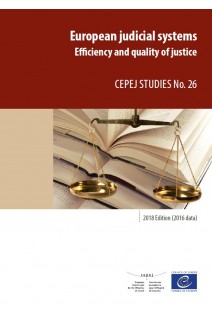



Accessing the information needed to understand, analyse and reform judicial systems is the aim of this report.
The latest edition of the report by the European Commission for the Efficiency of Justice (CEPEJ), which evaluates the functioning of judicial systems in 45 Council of Europe’s Member states as well as in Israel and Morocco, observer states to the CEPEJ, continues the process carried out since 2002, focusing on main indicators. In addition, it contains, for the first time, informations containing gender equality and the use of information technologies in judicial systems. Relying on a methodology which is already a reference for collecting and processing large numbers of quantitative and qualitative judicial data, this unique study has been conceived above all as a tool for public policy aimed at improving the efficiency and quality of justice. The objective of the CEPEJ in preparing this report is to enable policy makers, justice practitioners, researchers as well as those who are interested in the functioning of justice in Europe and beyond, to have access to the information needed to be able to understand, analyse and reform.
The CEPEJ internet statistical database is available for everyone on : www.coe.int/cepej
Chapter 1. The evaluation process of the CEPEJ
1.1 The European Commission for the Efficiency of Justice
1.2 The scheme for evaluating judicial systems
1.3 Data collection, validation and analysis
1.4 General methodological issues
1.5 General economic and demographic data
Chapter 2. Budgets of judicial systems
2.1 Budget of the whole justice system
2.3 Budget allocated to courts
2.4 Public budget allocated to the public prosecution services
2.5 Court taxes and fees
2.6 Public budget allocated to legal aid
Chapter 3. Judicial staff and lawyers
3.1 Judges
3.2 Prosecutors
3.3 Elements common to judges and prosecutors in matters of training, ethics and responsibility
3.4 Other court staff
Chapter 4. Organisation of courts
4.1 Judicial organisation
4.2 State of Information Technology (IT) Development in European Judicial Systems
4.3 Court users
Chapter 5. Efficiency and quality of the activity of courts and public prosecution services
5.1 General overview of court caseload
5.2 Civil and commercial justice (litigious cases): 2016 data and trends regarding performance indicators
5.3 Administrative justice: 2016 data and trends regarding performance indicators
5.4 Criminal justice: 2016 data and trends regarding performance indicators
5.5 Summary of trends and conclusions



Accessing the information needed to understand, analyse and reform judicial systems is the aim of this report.
The latest edition of the report by the European Commission for the Efficiency of Justice (CEPEJ), which evaluates the functioning of judicial systems in 45 Council of Europe’s Member states as well as in Israel and Morocco, observer states to the CEPEJ, continues the process carried out since 2002, focusing on main indicators. In addition, it contains, for the first time, informations containing gender equality and the use of information technologies in judicial systems. Relying on a methodology which is already a reference for collecting and processing large numbers of quantitative and qualitative judicial data, this unique study has been conceived above all as a tool for public policy aimed at improving the efficiency and quality of justice. The objective of the CEPEJ in preparing this report is to enable policy makers, justice practitioners, researchers as well as those who are interested in the functioning of justice in Europe and beyond, to have access to the information needed to be able to understand, analyse and reform.
The CEPEJ internet statistical database is available for everyone on : www.coe.int/cepej
Attention, en vertu de nos conditions générales de vente, l'achat des PDF/epub est réservé aux particuliers.
